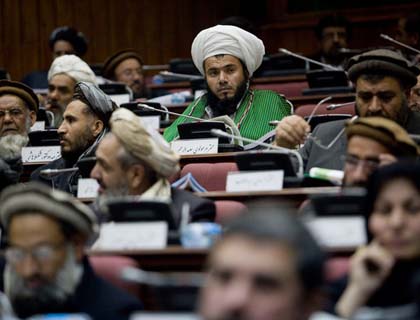KABUL - A hundred Wolesi Jirga members have filled out forms for participation in the proposed traditional Loya Jirga on an Afghan-US strategic cooperation pact, but others said they would not take part in the event.
More than 2,000 government officials and elders are scheduled to meet in mid-November in Kabul to discuss the pros and cons of the agreement. The gathering will also confer on a mechanism for peace negotiations with Afghan insurgents.
Participants, who will arrive in the capital four days ahead of the event, will be briefed on the objective behind the grand assembly. Beginning on Nov. 16, the deliberations will continue for four days.
All sitting parliamentarians, some former MPs, 30 percent members of each provincial council, representatives of civil society and special people, religious scholars and influential tribal elders will attend the Jirga.
President Hamid Karzai has earlier said Afghans would express their fears, opinions and demands at the Jirga. A final decision on the US-Afghanistan strategic cooperation agreement will come from the parliament, the president has said.
On July 29, 126 of the 249 members raised green cards, condemning the Jirga as unconstitutional. They vowed not to take part in the assembly.
Under the constitution, the Jirga involving parliamentarians, provincial and district council members is the highest manifestation of people's will. However, the grand assembly will convene at a time when the district councils are yet to be established.
MP Mohammad Daud Kalkani, also a member of the Reforms Coalition, told Pajhwok Afghan News he along with ninety-nine others lawmakers had filled out forms to attend the assembly. He hoped up to 200 MPs were expected to fill out the forms.
Asking his colleagues to attend the assembly because its recommendations would be sent to Parliament for approval, he said the president had the authority to convene such gatherings. He urged Karzai to contact lawmakers in this regard.
Another legislator from southeastern Paktika province, Nadir Khan Katawazai, also believed Wolesi Jirga members should attend the event in the best national interest. Reminded that participation in the Jirga would be against the sense of the house, he replied they should not take any decision in haste and choose the national interest over personal considerations.
He said participation in the Jirga was crucial because it would discuss issues of key national interest, including the peace process and the strategic cooperation deal with the US.
But a public representative from central Daikundi province, Asadullah Sadati, said he was against attending the assembly. The Law-Supporting Coalition member called the Jirga a parallel institution to the lower house.
He said parliamentarians should respect their own decision on the issue. "If we don't adhere to our own stand, we should not expect others to respect it," he remarked.
Similarly, a legislator from northern Kunduz province, Abdul Wadood Paiman, said the house had taken a unanimous decision that no member would take part in the Loya Jirga.
"If the Jirga is a consultative one, then it is up to us whether or not to take part," he said. However, he believed the Jirga was a decision-making forum and their participation would be an insult to the Wolesi Jirga.

